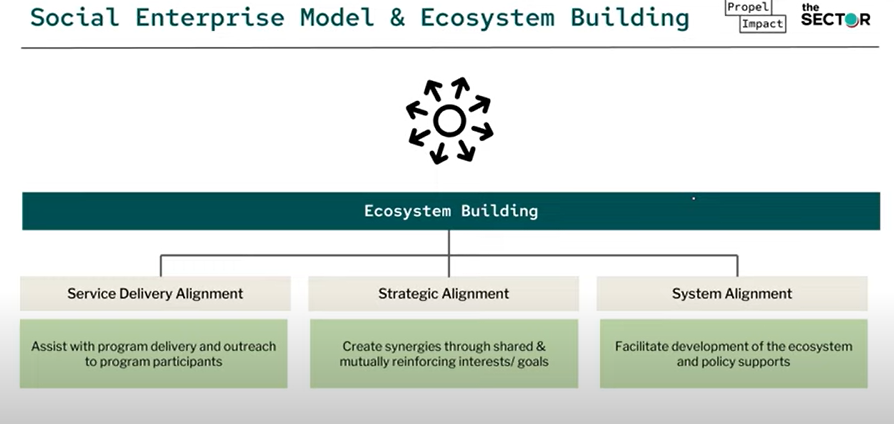How Social Enterprises Can Help Make a Difference in the World
Social enterprises are a unique and impactful way of doing business. They focus not only on making a profit but creating positive social and environmental change. In this blog post, we will explore the world of social enterprises, challenges, and the importance of supporting their growth. So, let’s dive in!
What is a Social Enterprise?

Let’s start by understanding what social enterprise, social innovation, and social finance mean. Simply put, social enterprises are businesses that prioritize social and environmental goals alongside financial sustainability. They aim to make a positive impact on society by addressing pressing issues like poverty, inequality, and climate change. Social innovation refers to the creative solutions and ideas that social enterprises develop to tackle these challenges. Lastly, social finance involves using financial tools and strategies to support and fund social enterprises.
Understanding these concepts is essential because it enables us to grasp the unique nature of market research for social enterprises. Traditional market research focuses primarily on profitability and consumer demand. For social enterprises, it’s crucial to consider the social and environmental impact their products or services will have. Research for social enterprises ensures products and services meet customer demands and align with their values, making a positive impact on society and the environment.
To illustrate these concepts in action, let’s take a look at some real-life examples. One inspiring social enterprise is TOMS, a company that pioneered the “One for One” business model. For every pair of shoes purchased, TOMS donates a pair to a child in need. Another notable example is Ben & Jerry’s, a beloved ice cream brand that prioritizes fair trade and environmentally sustainable practices. These examples show how social enterprises can create positive change while still being successful businesses.
Unique Challenges and Characteristics of Social Enterprises

Social enterprises have their own challenges and unique characteristics that make them different from regular businesses. One of the key challenges they encounter is securing funding. Social enterprises often struggle to access financial resources. Due to their unconventional business models, they focus on impact rather than profit. This limited financial support makes it difficult for social enterprises to scale their operations and reach more communities in need.
Another challenge is resource allocation, which can be a major hurdle for social enterprises. Social enterprises must ensure that their products or services address social needs effectively while generating enough revenue to sustain their operations. Balancing the allocation of resources between social impact and financial sustainability is a delicate task. This requires careful planning and strategic decision-making.
Despite these challenges, social enterprises have special qualities that make them strong catalysts for creating change. They prioritize social and environmental impact over maximizing profit, demonstrating a commitment to creating a better world. Social enterprises often create a feeling of togetherness and teamwork, working closely with people, organizations, and individuals in the community to solve social problems together.
Supporting Social Enterprise Ventures

Supporting the growth and scalability of social enterprises is crucial for creating a lasting impact. Social enterprises play a vital role in driving positive change. By providing them with the necessary support, we can amplify their efforts. There are several ways to support social enterprise ventures.
One effective way is through mentorship programs. Experienced professionals can offer guidance and expertise to social entrepreneurs. Helping them navigate the challenges they may face. Mentorship provides valuable insights and networks that can propel social enterprises forward.
Another way to support social enterprises is by creating funding opportunities. Access to capital is essential for social enterprises to expand their reach and increase their impact. Governments, foundations, and impact investors can play a significant role in providing financial resources to support these ventures.
Partnerships play a pivotal role in supporting social enterprises. Working collaboratively with other organizations can lead to increased resources, shared knowledge, and a greater impact. This applies the social enterprise sector and other sectors. By working together, social enterprises can achieve more than they could individually.
The “Ecosystem Build” Approach

The “ecosystem build” approach is a strategic method that aims to create a supportive ecosystem for social enterprises to thrive. This approach involves different actors within the ecosystem, each playing various roles and having different relationships with each other, the target market, and the social enterprise itself. If you want to learn more about this approach, you can watch the full webinar here.
There are three broad categories of partners involved in the “ecosystem build” approach:
- Service Delivery Level Partners: These partners assist with program delivery and reaching out to program participants. They help in delivering the potential solution and ensuring its effectiveness and impact.
- Strategic Alignment Partners: These partners collaborate with social enterprises based on shared goals and mutually reinforcing objectives. The partnership creates synergies and collective impact, allowing for greater effectiveness in driving positive change.
- System Alignment Partners: These partners focus on facilitating the development of ecosystem supports at a macro level. They work on creating policy supports and other resources that enable social enterprises to operate and grow within a supportive environment.
By engaging with partners from these different categories, social enterprises can access a wide range of resources, expertise, and support. This collaborative approach helps overcome challenges, leverage strengths, and maximize the impact of social enterprises.
The Bottom Line
To wrap up, social enterprises are a powerful force for positive change in our society. By combining business acumen with a commitment to social and environmental impact, they address pressing issues and create a more sustainable future. Remember, every time you support a social enterprise, you contribute to a better world. So, next time you make a purchasing decision, consider choosing a social enterprise and become part of the movement driving positive change.

